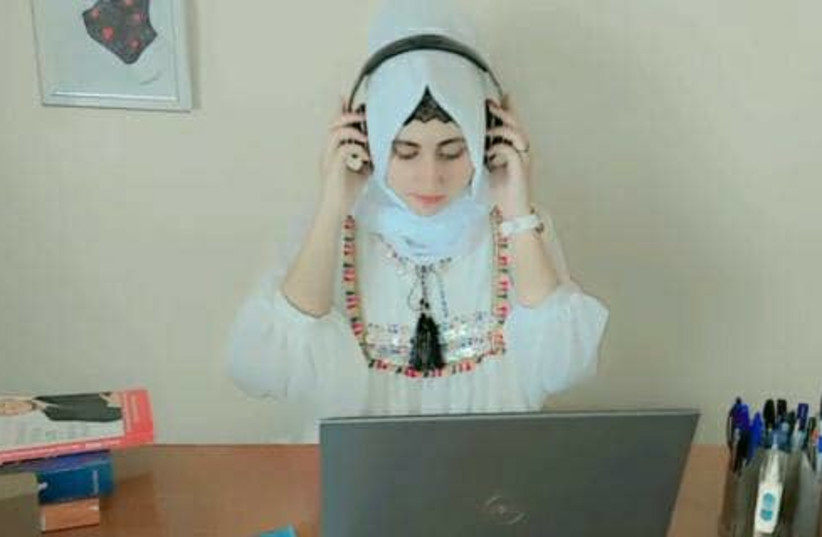One year after girls in Afghanistan were banned from school, Shabnam “Ahmadi” (a pseudonym she and her sister use when speaking to the media), a 12 th -grade student in Kabul, risks her life daily to teach and keep learning herself.
For more stories from The Media Line go to themedialine.org
She told The Media Line that since education was outlawed for girls, she and many others have searched for the means to educate themselves without the Taliban knowing. “If they become aware that girls are receiving education in a certain way, they will ban the means as they banned school for girls,” she said.
"I am really afraid that the Taliban will find out I'm teaching English."
Shabnam “Ahmadi”
Shabnam, in addition to continuing her own education through old books that she has, decided to open online English classes for other Afghan girls as she believes it is a way to serve her nation and the Afghan people.

“I am really afraid that the Taliban will find out I’m teaching English,” she said. “Every day I delete many messages from my WhatsApp and from my phone before I leave my house.” She added that her family is educated, and her sister is a well-known women’s rights activist who could attract the Taliban’s attention.
However, she is willing to take a chance. “I accept the risk; I’m struggling against these
restrictions, and I will continue my lessons.” The Taliban took over Afghanistan in August 2021. Since then, girls’ schools have remained closed. The Taliban claim that girls’ schools will reopen as soon as they adapt the system to
shariah – Islamic religious law. Boys were allowed back to school in September 2021, just weeks after the Taliban takeover, while girls were told to stay home. Over the past year, the Taliban promised to reopen girls’ schools several times, but the promises remained unfulfilled once again this week as a new school year began.
The United Nations has expressed dissatisfaction with the situation and has called on the Taliban to reopen schools for girls. Markus Potzel, the acting head of the UN Assistance Mission in Afghanistan, called the one-year anniversary of girls’ schools being closed “tragic, shameful, and entirely avoidable.”
“The ongoing exclusion of girls from high school has no credible justification and has no
parallel anywhere in the world. It is profoundly damaging to a generation of girls and to the
future of Afghanistan itself,” he added.
Lawyer and women’s rights activist Selsela “Ahmadi,” Shabnam’s sister, told The Media Line
that the Taliban usually reject the statements of the United Nations on the matter, insisting
that the lack of education for girls is a part of the Afghan people’s culture.
“These are the kinds of lies always released by the Taliban,” said Selsela.
Hasina Safi, Afghanistan’s women’s affairs minister before the Taliban took power and
dissolved the ministry, and now a women’s rights activist in London, told The Media Line
that women’s development and education are not part of the Taliban’s agenda.
Why does the Taliban not allow girls to go to school?
Rim Aljabi, a gender adviser for the MENA region at the Tunisia-based organization Search
for Common Ground, told The Media Line that the Taliban claim the main reason why they do not allow girls to go to school is because, due to the unrest in the country, it is unsafe for girls to leave their homes. But in fact, says Aljabi, the Taliban see women’s empowerment as a threat. “Therefore, they are not allowing them to access education and are limiting their public participation as much as possible,” she said.
Taliban spokesman Zabihullah Mujahid said in an interview with the Voice of America that the Taliban were doing as much as possible to ensure that the girls’ schools would open after the education system is adapted to Shariah. He urged the international community not to interfere.
“This is the internal problem of Afghanistan. It is the issue of our people. It is the issue of my children and my daughter. There is no room for outside intervention,” he said in the interview. However, Aljabi says that the international community should keep promoting the issue of women’s right to education, particularly among allies who have ties with the Taliban.
“Allowing women to return to education should be a must and a condition for any relationship – diplomatic, economic, etc. – with the Taliban,” she added. Safi, the former women’s affairs minister, urged both the Taliban and the international community to prioritize women’s rights as an important step in moving society forward.
“This is the time both the Taliban and the international community must think about women’s development, building up the family which is a part of the global family, meaning society,” she said.
